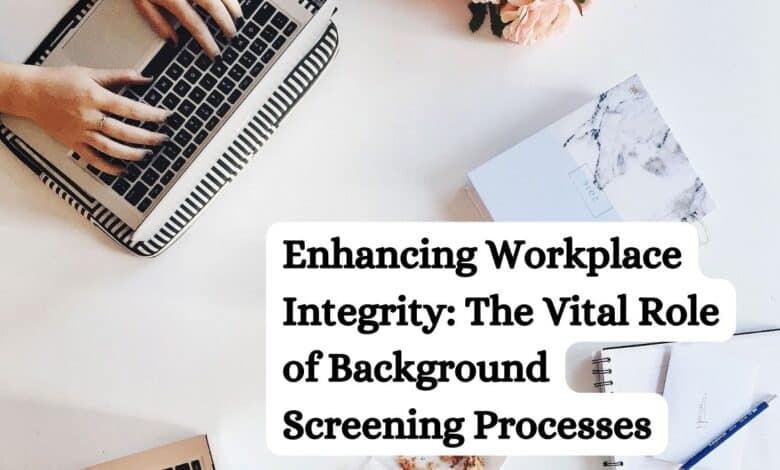Enhancing Workplace Integrity: The Vital Role of Background Screening Processes
"Discover the critical role of background screening in fostering workplace integrity and trust.

Ensure workplace integrity with effective background screening processes. Learn their crucial role for a trustworthy work environment.
Key Takeaways:
- Background screenings ensure the integrity and safety of the workplace.
- Compliance with laws like the FCRA is a must for conducting background checks.
- Technological advancements have streamlined and improved the background check process.
- Investing in comprehensive background checks is cost-effective in the long term.
- Maintaining candidate privacy is a critical aspect of the screening process.
- International background checks pose unique challenges that can be navigated with strategic planning and expertise.
- A structured approach to background screening is essential for fairness and effectiveness.
Integrity and trust form the bedrock of any successful workplace. To ensure these values are upheld, employers depend on comprehensive background screening processes to verify the qualifications and histories of potential hires.
Whether for protecting assets, safeguarding other employees, or maintaining a company’s good reputation, these checks are indispensable in cultivating a secure and trustworthy work environment. By implementing thorough screening practices, employers can make informed hiring decisions that contribute to a positive corporate culture and reduce the potential for workplace issues.
Understanding Background Screening
Background screening is more than a cursory look at a candidate’s resume. It’s an in-depth process that assesses various aspects of a person’s background to ensure they are reliable and fit for the role they are applying for.
This includes checking for a criminal record, verifying education and employment history, and sometimes even evaluating their credit history. Such detailed checks can help reduce fraud, embezzlement, and other forms of malpractice within the company.
Legal Considerations in Background Screening
Conducting background checks is not just about due diligence; it’s also about legal compliance. Employers must understand and adhere to laws regulating personal information use for employment purposes.
The Fair Credit Reporting Act (FCRA), for instance, aims to ensure that the information collected is used fairly and that the privacy of the individuals is respected. Failure to comply can result in legal repercussions, including fines and damage to the employer’s reputation.
Background Screening and Workplace Safety
A robust background screening process is integral to creating a safe workplace. Employers who skip these checks may inadvertently hire individuals with a history of violent behavior, which can lead to tragic consequences.
This commitment to safety is reflected not just within the workplace but in society, where effective background screenings play a role in preventing dangerous individuals from obtaining firearms, as highlighted by a recent article on background checks and domestic violence.
Therefore, comprehensive background checks have a far-reaching impact, aiding in protecting more comprehensive community safety.
Technology and Modern Background Checks
Technology has greatly enhanced the efficacy of background screenings. Employers can now leverage online databases and software to conduct screenings quickly and thoroughly. This has increased the pace at which background checks can be completed and the accuracy of the information obtained.
Innovative digital solutions for background checks are becoming increasingly prevalent, as detailed in a news piece focusing on digital transformation in background screening. These advancements have the potential to reshape hiring practices globally.
The Cost-Benefit Analysis of Thorough Background Checks
The financial cost of background screenings is often dwarfed by the benefits they bring. The repercussions of hiring unsuitable or risky candidates can far surpass the initial price of comprehensive vetting be it through loss of business due to fraudulent activities or legal costs from potential litigation. Thus, an upfront investment in a rigorous screening process is both a protective measure and a strategic business decision.
Background Screening: A Tool for Informed Decision-Making
Hiring managers and HR professionals consider background screenings an indispensable tool to ensure they are filling positions and doing so with the best possible candidates. Transparent and reliable background checks allow employers to gather critical information that helps form a holistic view of an applicant’s past behavior, thus guiding wiser hiring decisions that can affect the trajectory of the business in the long term.
Addressing Privacy Concerns in Background Screening
Employers must balance the comprehensive nature of screenings with the privacy of the candidates. It’s a delicate act, ensuring enough information is gathered to make an informed decision while respecting the individual’s right to privacy. Keeping candidates informed about the extent and use of the information gathered promotes transparency and trust, reinforcing ethical standards in the hiring process.
International Background Screening: Challenges and Solutions
Background screening can become complex for multinational companies due to different laws and cultural practices across countries. This requires a good understanding of international regulations and a flexible approach to accommodate the diverse backgrounds of potential hires. By working with specialized agencies or using international screening tools, businesses can navigate these challenges effectively and maintain a consistent hiring standard everywhere they operate.
Implementing a Fair and Effective Background Screening Program
Businesses must be organized and consistent to have a practical background screening process. This requires established procedures, training for those conducting the screenings, and open communication with candidates about the process. Through structured and fair practices, background screenings can enhance workplace integrity and safety while ensuring equity and respect for those being screened.




